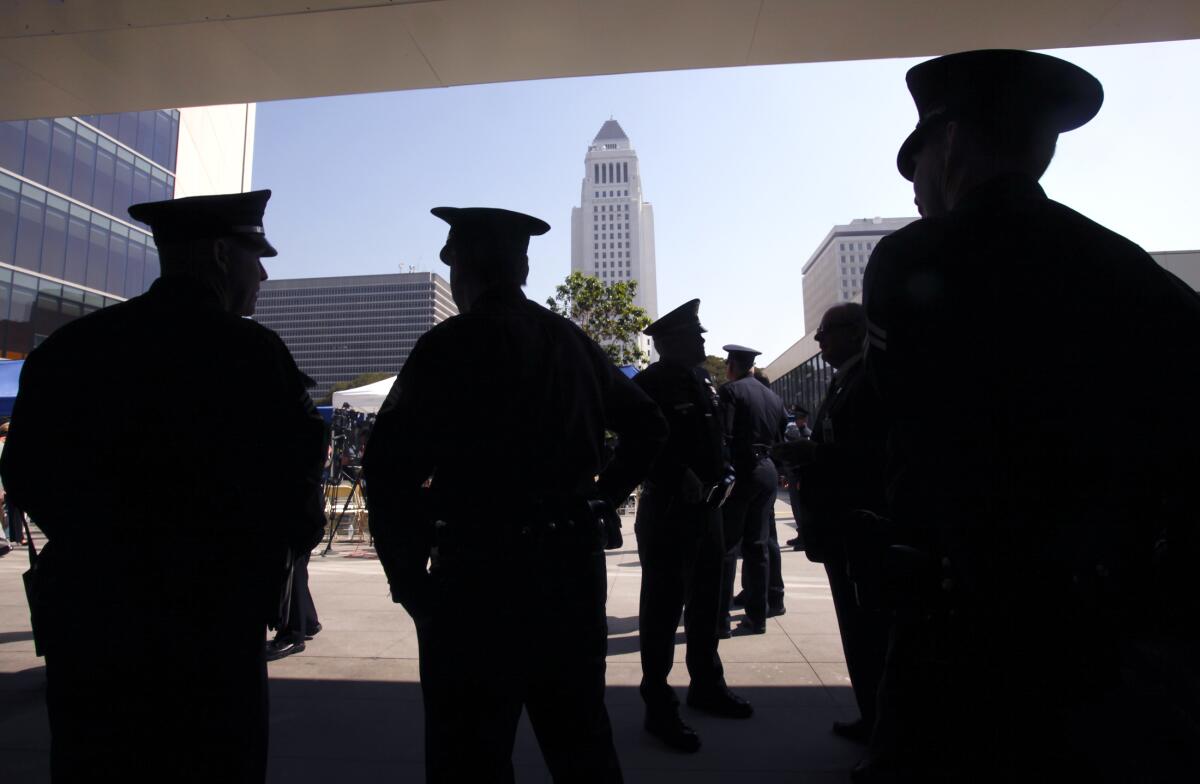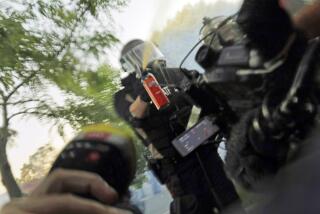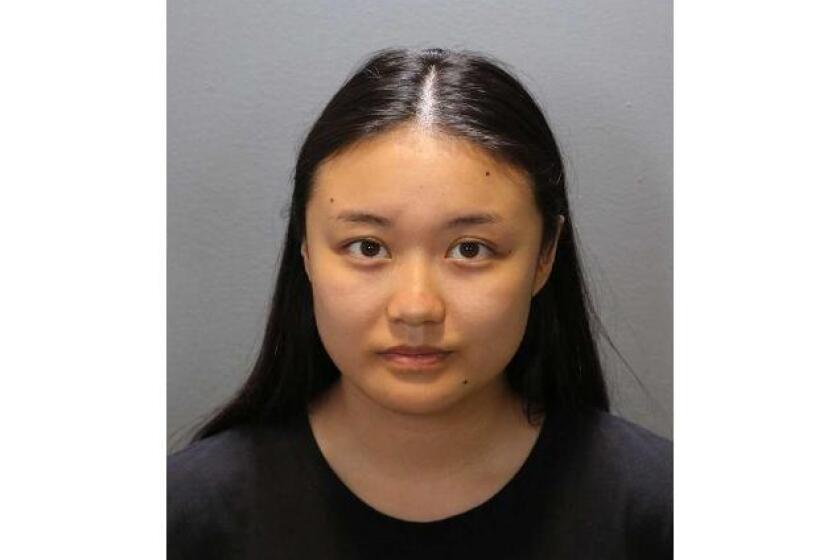L.A. sues journalist, activist group to claw back photos of undercover officers

In a move immediately denounced as legally meritless by 1st Amendment and media rights experts, the city of Los Angeles has sued a local journalist and an activist group over the online publication of undercover LAPD officers’ pictures — images the city had itself provided.
Attorneys for the city claim the release of the images in response to a public records request and related litigation by Knock LA journalist Ben Camacho was “inadvertent” and posed a safety risk to the officers. Camacho subsequently provided the images to the Stop LAPD Spying Coalition, which published them online.
“The City seeks the return of these inadvertently produced photos to protect the lives and work of these undercover officers,” the city’s attorneys wrote.
Both Knock LA and the Stop LAPD Spying Coalition denounced the lawsuit in separate statements. Knock LA, a nonprofit online newsroom, called it a “clear intimidation tactic” by City Atty. Hydee Feldstein Soto. The Stop LAPD Spying Coalition, a technology oversight group advocating for police abolishment, called it “an attack on the public’s ability to request, analyze, and publish public records.”
Susan Seager, an attorney for Camacho, said in a written statement that her client “will fight the City’s effort to censor his journalism about police, which is a matter of paramount concern.” Camacho declined to comment.
Legal experts uniformly rejected the lawsuit as baseless and ripe for dismissal under the 1st Amendment and other well-established legal protections for journalists.
“This is a Hail Mary, desperation play by the city,” said David Loy, legal director of the California First Amendment Coalition.
“The city is on very weak legal grounds,” said Erwin Chemerinsky, dean of the UC Berkeley School of Law.
“This isn’t even a close call,” said Ken Paulson, former editor in chief of USA Today and now director of the Free Speech Center at Middle Tennessee State University.
The lawsuit follows weeks of controversy after the Los Angeles Police Department’s release of the names, photographs and other identifying information of more than 9,300 officers in response to a public records request and subsequent litigation by Camacho.
Hamid Khan, a coordinator with Stop LAPD Spying, said Camacho “shared” the officers’ images and information with his organization. The group then posted them online as part of a public, searchable database called “Watch the Watchers,” which includes each officer’s name, ethnicity, rank, date of hire, division/bureau, serial number and photo.
The union that represents rank-and-file LAPD officers subsequently sued Chief Michel Moore over the release of the photos, hoping to force the department to stop disclosing such images and try to claw back those already released. More than 300 LAPD officers who claim to work in sensitive assignments have also given notice that they intend to sue the city for negligence and for allegedly endangering their lives by releasing the images.
Robert Rico, legal counsel for the Los Angeles Police Protective League, has said the union in its lawsuit will ask a judge to force the “Watch the Watchers” website to be taken down until the city determines which officers’ images should be excluded for security reasons.
The city attorney’s office, which is also seeking to have the officers’ photos removed from the website, said Thursday that its goal was protecting officers “whose lives and families’ lives could be in grave danger as a result of this exposure.”
Seager questioned the alleged danger posed by the photos’ release. Contrary to the city’s lawsuit, she said in her statement, the city attorney’s office “hand-delivered” the photos to her client in September along with a letter that said in part: “images of officers working in an undercover capacity as of the time the pictures were downloaded (end of July 2022) are not included.”
“The disclosure was not ‘inadvertent’ or a ‘mistake,’” she wrote. After releasing the records to Camacho, the city “now is trying to rewrite history by claiming it wishes it had withheld photos of both undercover officers and officers who ‘serve in sensitive assignments.’”
“This is an impossibly broad category of officers that could include just about any officer’s work at some point during their career,” Seager said.
Legal experts said city officials may be suing Camacho and the Stop LAPD Spying Coalition to show they are taking the officers’ and the union’s concerns seriously and making a good-faith effort to get the images off the internet.
However, that doesn’t mean it will work, the experts said.
“The U.S. Supreme Court has made clear that government cannot restrain publication of information by a news organization,” Paulson said. “That would certainly apply in this case.”
Paulson cited the famous Pentagon Papers case, in which the Supreme Court ruled that the federal government could not prevent newspapers from publishing classified reports about the Vietnam War that had been leaked by a military analyst.
“When you recognize that the highest court in the land — dealing with an argument from the U.S. government that these documents would pose irreparable harm to the security of the United States — still concluded that news organizations could publish the information, then you know [L.A.’s lawsuit] is not a close call,” Paulson said.
Paulson said his impression from the complaint was that the city was embarrassed by its own blunder, facing litigation from officers, and making a futile effort to show that it had at least tried to claw the images back.
“This lawsuit really feels like an exercise in saving face,” he said.
Kelli Sager, a practicing 1st Amendment lawyer in California who has represented the Los Angeles Times in the past, agreed.
“At this point everyone on the internet has these photographs, so I don’t see any legal basis for the city to be demanding the return of them or for them to be taken down from the website,” Sager said. “This is a reaction to the city being sued, so they can say they are doing something.”
Sager said the city’s complaint fails for multiple reasons, but in part because the images have already been published online for weeks.
“The courts have said once it’s become public, then the cat is out of the bag, the horse is out of the barn, there is nothing you can lawfully do, because the justification for it would be to keep the information secret, and that’s no longer possible,” Sager said.
Both Paulson and Sager said it does not matter if the city hadn’t intended to give Camacho the photographs, or if they had agreed in prior litigation that photographs of undercover officers would not be included in the release of documents. The fact is, they gave him the photographs.
Chemerinsky said the law “is clearly established that when the press lawfully obtains something, they’re allowed to truthfully report it,” and Camacho obviously obtained the images lawfully here.
It’s simply too late, he said, for the city to change its mind.
Loy noted there is a California Supreme Court ruling that said the government has, in limited circumstances, a right to try to claw back certain documents that were inappropriately released, but this case is distinct from that one.
Here, “the city is not just asking for the documents back,” he said. “The city wants to stop the journalist and Stop LAPD Spying from actually further posting what they already had. That’s a prior restraint, and that’s blatantly unconstitutional under the 1st Amendment.”
Several city officials have said publicly that the responsibility for releasing the images was the city’s.
Moore apologized for the disclosure in a departmentwide email. In an interview with The Times, he acknowledged that the city had “erred” in releasing the images and assured officers that he has taken steps to address their safety concerns.
A spokesman for the police union told The Times that the union is more concerned about the city’s “colossal blunder” than with the journalist who first received the photos or the watchdog group that published them. The department’s independent inspector general has launched an investigation into how the records were released.
On Tuesday, Mayor Karen Bass declined to say whether she supported the city’s lawsuit against a journalist, but called the release of the images an “egregious mistake” and said she feared it would lead to more officers leaving the LAPD at a time when its ranks are already diminished.
Bass said those responsible for the release “need to be held fully accountable.”
The city’s action drew strong denouncements in local journalism circles.
Cerise Castle, Knock LA’s managing editor, said city officials routinely try to suppress efforts by independent journalists and those at smaller media outlets to publish potentially damaging information about police.
Times staff writer Julia Wick contributed to this report.
More to Read
Start your day right
Sign up for Essential California for news, features and recommendations from the L.A. Times and beyond in your inbox six days a week.
You may occasionally receive promotional content from the Los Angeles Times.









